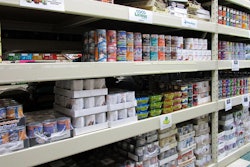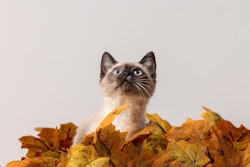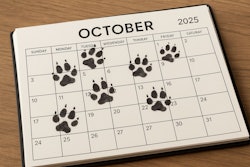
The rapid growth in the popularity of private-label pet food observed during the peak of the economic crisis in Europe seems to be winding down, though this segment continues to expand its presence in certain countries and market segments.
Over the past several years, private labels — products manufactured by one company for sale under another's brand — expanded their share of the European pet food market, especially in Eastern Europe, where inflation took a toll on the population's purchasing power.
With inflation peaking in 2022, private-label pet food increased in popularity as consumers sought value-for-money options, commented Liseth Galvis-Corfe, a consultant at data analytics company Euromonitor International.
Private-label share growth has been stronger in Eastern Europe than in Western Europe, rising 3.4% compared to 0.3% between 2022 and 2024.
"A reason for this is the stronger presence of households with high disposable income in the Western European market that are less sensitive to the increase in prices," Galvis-Corfe noted.
Even in Eastern Europe, the results of competition between private-label and branded pet food were a mixed bag.
"The branded [dog food] product segment [in Poland] is almost twice as large as private label and has been gaining value much faster," said Jakub Dubniak, consultant at YouGov, a market research company.
Despite this, Poles still buy nearly 30% of dog food under private label rather than branded pet food.
"Consumer price sensitivity has contributed to the increase in the share of products purchased on sale, especially in the private label segment," Dubniak added.
Amid the rise in private-label share, the two big players, Mars and Nestlé, accounted for 50% of the market in Eastern Europe and 45% in Western Europe in 2024. This is a slight reduction compared to the 53.6% share the brands had in Eastern Europe in 2022 and 45.2% in Western Europe, Galvis-Corfe added.
In Poland's cat food market, brands are growing faster than private label, Dubniak said.
"In 2024, branded products in the cat food category grew dynamically in both sales value and volume, while private labels maintained results similar to the previous year," Dubniak revealed.
The ceiling is nearly hit
The private label segment has nearly exhausted its growth potential in Western Europe, though it still has room for growth in some Eastern European countries, according to analysts.
"In Western Europe, brand loyalty is strong, and some pet parents prefer to save in other expenses rather than on their pets," Galvis-Corfe said. "For this reason, we don't expect a strong increase in the share of private label in Western Europe."
Cats, for example, are picky eaters and switching to private label is not always straightforward, Galvis-Corfe noted.
"Add to this, with lower birth rates, more people decide to adopt a pet and provide good quality food," Galvis-Corfe said. "Despite that, private label is growing; its share in the premium segment is smaller compared to the economy tier. In the premium segment, branded products are well-positioned."
In Eastern Europe, private label is gaining ground in markets such as Romania, Bulgaria, Slovakia, Poland and Hungary, and innovation in premium private label is expected to continue to drive share growth, Galvis-Corfe said.
Private label grows in Russia
Pet food has become one of the fastest-growing segments of the Russian private-label industry in recent years, according to Zooinform, a Moscow-based consultancy.
Nearly 15% of almost 800 pet food brands that emerged in Russia in 2022 and 2023 were private label, reported Nadezhda Avdonina, a Zooinform analyst.
"The challenging macroeconomic situation, with high inflation and declining real incomes, is further stimulating demand for more affordable private label products," Avdonina said.
"Retailers are actively capitalizing on this trend, turning private-label products into an effective tool for building customer loyalty," Avdonina added. "The rise in popularity of hard discounters, where private labels account for a significant portion of the product range, is particularly noticeable."
According to a study by Infoline, a Moscow-based think tank, the share of shoppers consciously choosing Russian private labels in pet stores increased from 42% in 2022 to 62% in 2023 and is projected to grow.
In 2024, a group of Russia's largest retailers, including Pyaterochka, Globus, Lenta and Detsky Mir, launched new private-label pet food products — a move that promises to further fuel growth in the segment.















